Impact of Reward System on Employee Productivity at Maritime LTD
VerifiedAdded on 2020/10/05
|47
|13150
|83
Report
AI Summary
This report examines the impact of reward systems on the productivity of employees, specifically lorry drivers, at Maritime Transport LTD. The study investigates the factors contributing to effective reward systems, performance indicators for monitoring employees, and the relationship between employee performance and rewards. It also analyzes the current reward system used by Maritime Transport LTD and suggests improvements, emphasizing the importance of a mix of intrinsic and extrinsic rewards for employee satisfaction, motivation, and retention. The research employs qualitative methods, collecting data from primary and secondary sources to address research questions aligned with the objectives of the study. The report includes a literature review, methodology, findings, discussion, and conclusion, offering recommendations for enhancing employee engagement and productivity through a well-designed reward system. The findings suggest that a blend of monetary and non-monetary rewards is most effective for boosting employee satisfaction, engagement, and retention, ultimately improving overall company productivity.
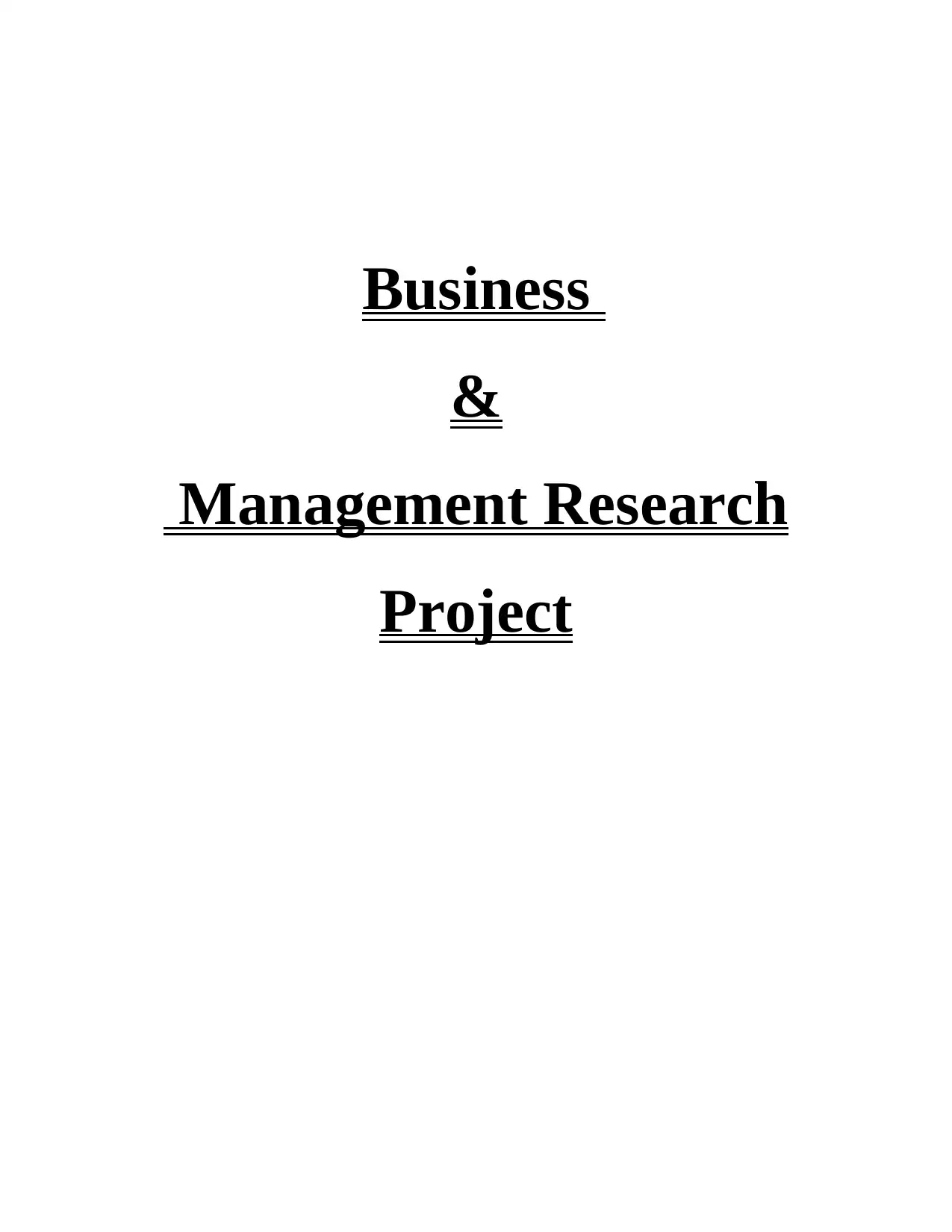
Business
&
Management Research
Project
&
Management Research
Project
Paraphrase This Document
Need a fresh take? Get an instant paraphrase of this document with our AI Paraphraser
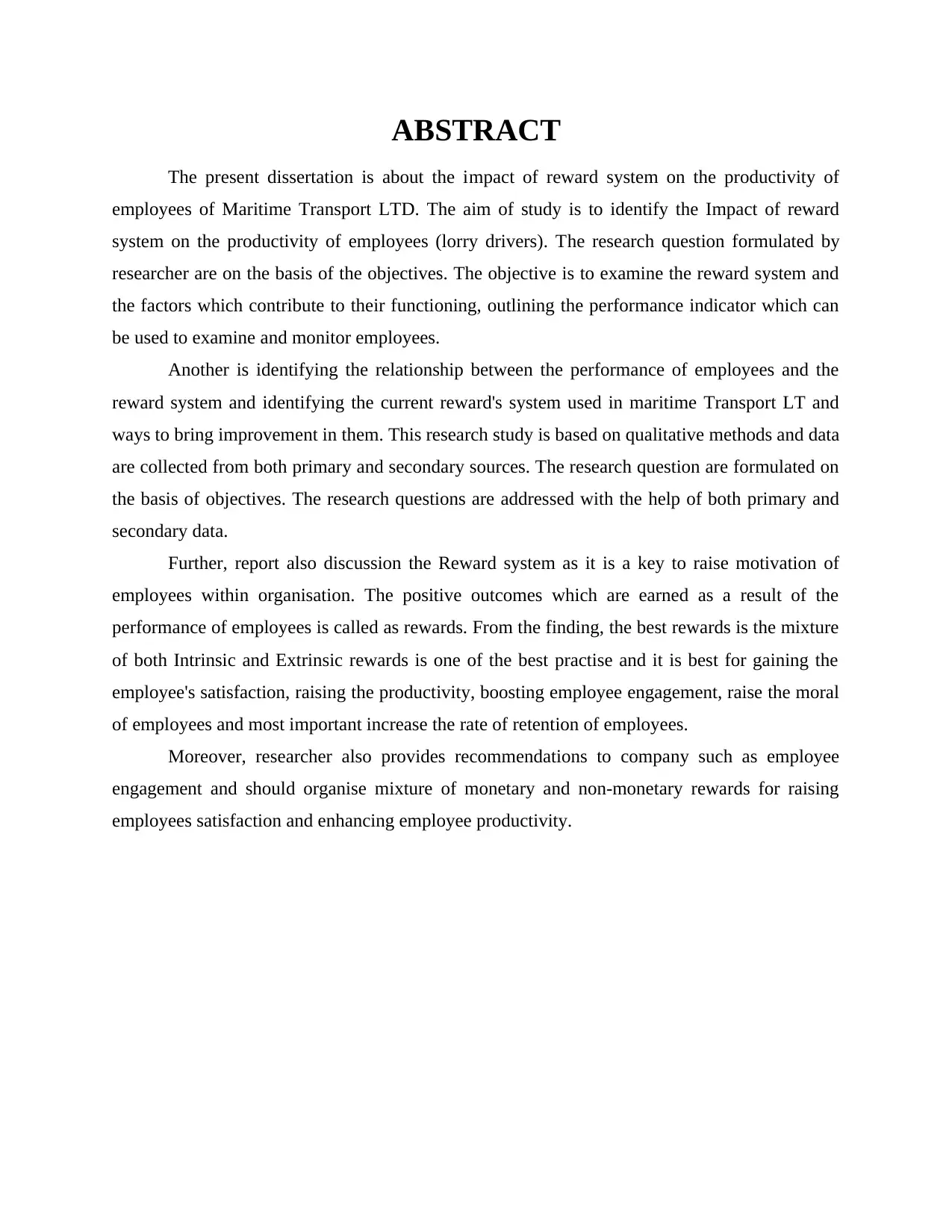
ABSTRACT
The present dissertation is about the impact of reward system on the productivity of
employees of Maritime Transport LTD. The aim of study is to identify the Impact of reward
system on the productivity of employees (lorry drivers). The research question formulated by
researcher are on the basis of the objectives. The objective is to examine the reward system and
the factors which contribute to their functioning, outlining the performance indicator which can
be used to examine and monitor employees.
Another is identifying the relationship between the performance of employees and the
reward system and identifying the current reward's system used in maritime Transport LT and
ways to bring improvement in them. This research study is based on qualitative methods and data
are collected from both primary and secondary sources. The research question are formulated on
the basis of objectives. The research questions are addressed with the help of both primary and
secondary data.
Further, report also discussion the Reward system as it is a key to raise motivation of
employees within organisation. The positive outcomes which are earned as a result of the
performance of employees is called as rewards. From the finding, the best rewards is the mixture
of both Intrinsic and Extrinsic rewards is one of the best practise and it is best for gaining the
employee's satisfaction, raising the productivity, boosting employee engagement, raise the moral
of employees and most important increase the rate of retention of employees.
Moreover, researcher also provides recommendations to company such as employee
engagement and should organise mixture of monetary and non-monetary rewards for raising
employees satisfaction and enhancing employee productivity.
The present dissertation is about the impact of reward system on the productivity of
employees of Maritime Transport LTD. The aim of study is to identify the Impact of reward
system on the productivity of employees (lorry drivers). The research question formulated by
researcher are on the basis of the objectives. The objective is to examine the reward system and
the factors which contribute to their functioning, outlining the performance indicator which can
be used to examine and monitor employees.
Another is identifying the relationship between the performance of employees and the
reward system and identifying the current reward's system used in maritime Transport LT and
ways to bring improvement in them. This research study is based on qualitative methods and data
are collected from both primary and secondary sources. The research question are formulated on
the basis of objectives. The research questions are addressed with the help of both primary and
secondary data.
Further, report also discussion the Reward system as it is a key to raise motivation of
employees within organisation. The positive outcomes which are earned as a result of the
performance of employees is called as rewards. From the finding, the best rewards is the mixture
of both Intrinsic and Extrinsic rewards is one of the best practise and it is best for gaining the
employee's satisfaction, raising the productivity, boosting employee engagement, raise the moral
of employees and most important increase the rate of retention of employees.
Moreover, researcher also provides recommendations to company such as employee
engagement and should organise mixture of monetary and non-monetary rewards for raising
employees satisfaction and enhancing employee productivity.
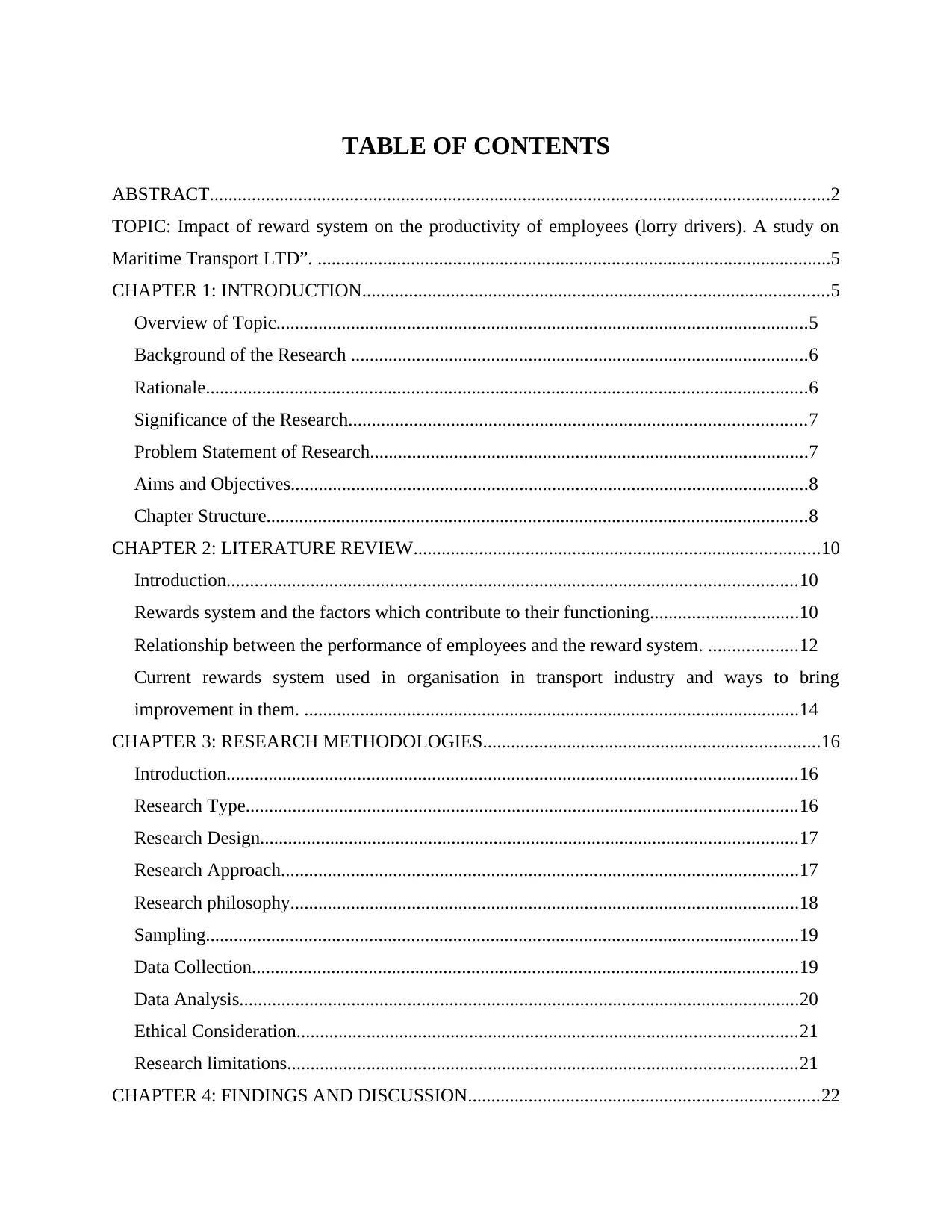
TABLE OF CONTENTS
ABSTRACT.....................................................................................................................................2
TOPIC: Impact of reward system on the productivity of employees (lorry drivers). A study on
Maritime Transport LTD”. ..............................................................................................................5
CHAPTER 1: INTRODUCTION....................................................................................................5
Overview of Topic..................................................................................................................5
Background of the Research ..................................................................................................6
Rationale.................................................................................................................................6
Significance of the Research..................................................................................................7
Problem Statement of Research..............................................................................................7
Aims and Objectives...............................................................................................................8
Chapter Structure....................................................................................................................8
CHAPTER 2: LITERATURE REVIEW.......................................................................................10
Introduction..........................................................................................................................10
Rewards system and the factors which contribute to their functioning................................10
Relationship between the performance of employees and the reward system. ...................12
Current rewards system used in organisation in transport industry and ways to bring
improvement in them. ..........................................................................................................14
CHAPTER 3: RESEARCH METHODOLOGIES........................................................................16
Introduction..........................................................................................................................16
Research Type......................................................................................................................16
Research Design...................................................................................................................17
Research Approach...............................................................................................................17
Research philosophy.............................................................................................................18
Sampling...............................................................................................................................19
Data Collection.....................................................................................................................19
Data Analysis........................................................................................................................20
Ethical Consideration...........................................................................................................21
Research limitations.............................................................................................................21
CHAPTER 4: FINDINGS AND DISCUSSION...........................................................................22
ABSTRACT.....................................................................................................................................2
TOPIC: Impact of reward system on the productivity of employees (lorry drivers). A study on
Maritime Transport LTD”. ..............................................................................................................5
CHAPTER 1: INTRODUCTION....................................................................................................5
Overview of Topic..................................................................................................................5
Background of the Research ..................................................................................................6
Rationale.................................................................................................................................6
Significance of the Research..................................................................................................7
Problem Statement of Research..............................................................................................7
Aims and Objectives...............................................................................................................8
Chapter Structure....................................................................................................................8
CHAPTER 2: LITERATURE REVIEW.......................................................................................10
Introduction..........................................................................................................................10
Rewards system and the factors which contribute to their functioning................................10
Relationship between the performance of employees and the reward system. ...................12
Current rewards system used in organisation in transport industry and ways to bring
improvement in them. ..........................................................................................................14
CHAPTER 3: RESEARCH METHODOLOGIES........................................................................16
Introduction..........................................................................................................................16
Research Type......................................................................................................................16
Research Design...................................................................................................................17
Research Approach...............................................................................................................17
Research philosophy.............................................................................................................18
Sampling...............................................................................................................................19
Data Collection.....................................................................................................................19
Data Analysis........................................................................................................................20
Ethical Consideration...........................................................................................................21
Research limitations.............................................................................................................21
CHAPTER 4: FINDINGS AND DISCUSSION...........................................................................22
⊘ This is a preview!⊘
Do you want full access?
Subscribe today to unlock all pages.

Trusted by 1+ million students worldwide
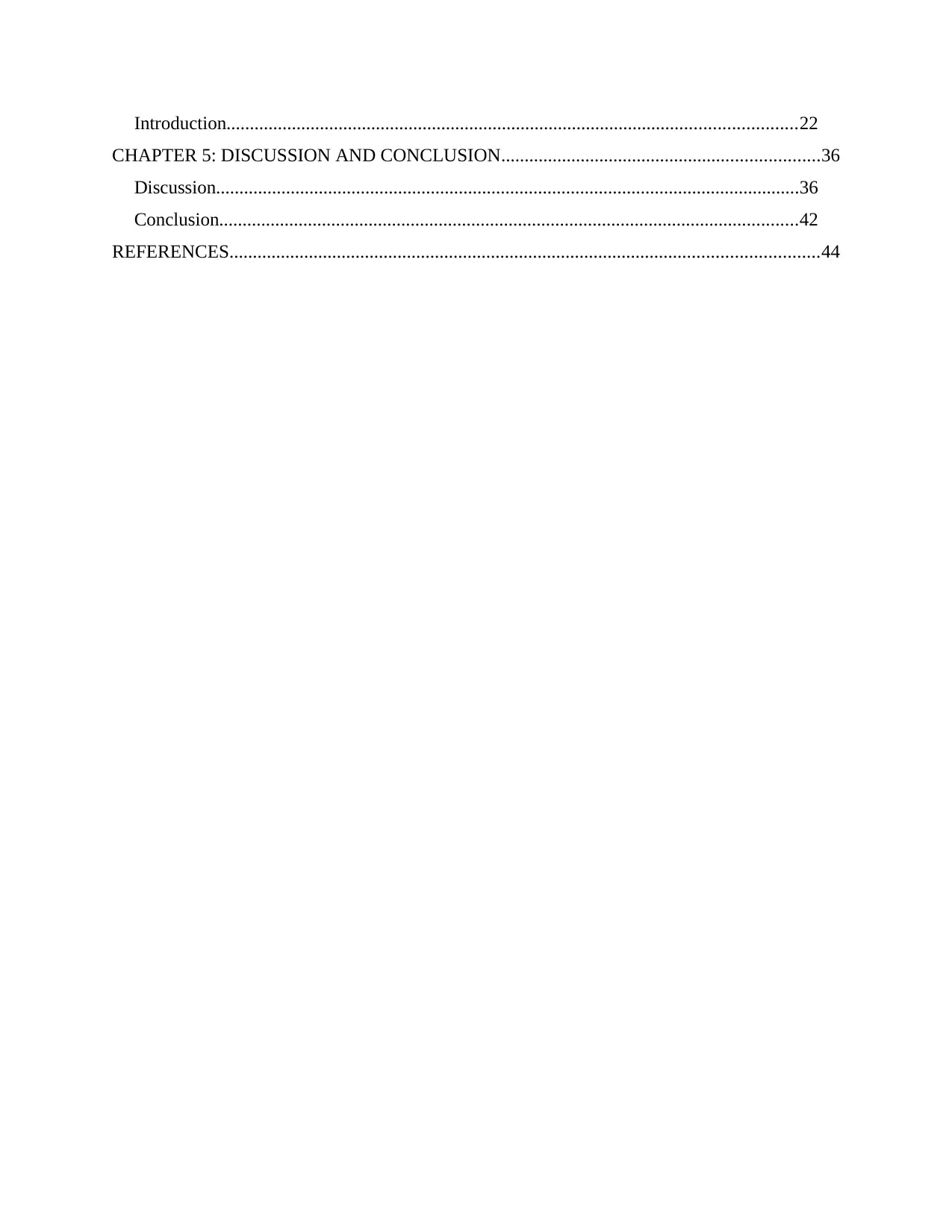
Introduction..........................................................................................................................22
CHAPTER 5: DISCUSSION AND CONCLUSION....................................................................36
Discussion.............................................................................................................................36
Conclusion............................................................................................................................42
REFERENCES..............................................................................................................................44
CHAPTER 5: DISCUSSION AND CONCLUSION....................................................................36
Discussion.............................................................................................................................36
Conclusion............................................................................................................................42
REFERENCES..............................................................................................................................44
Paraphrase This Document
Need a fresh take? Get an instant paraphrase of this document with our AI Paraphraser
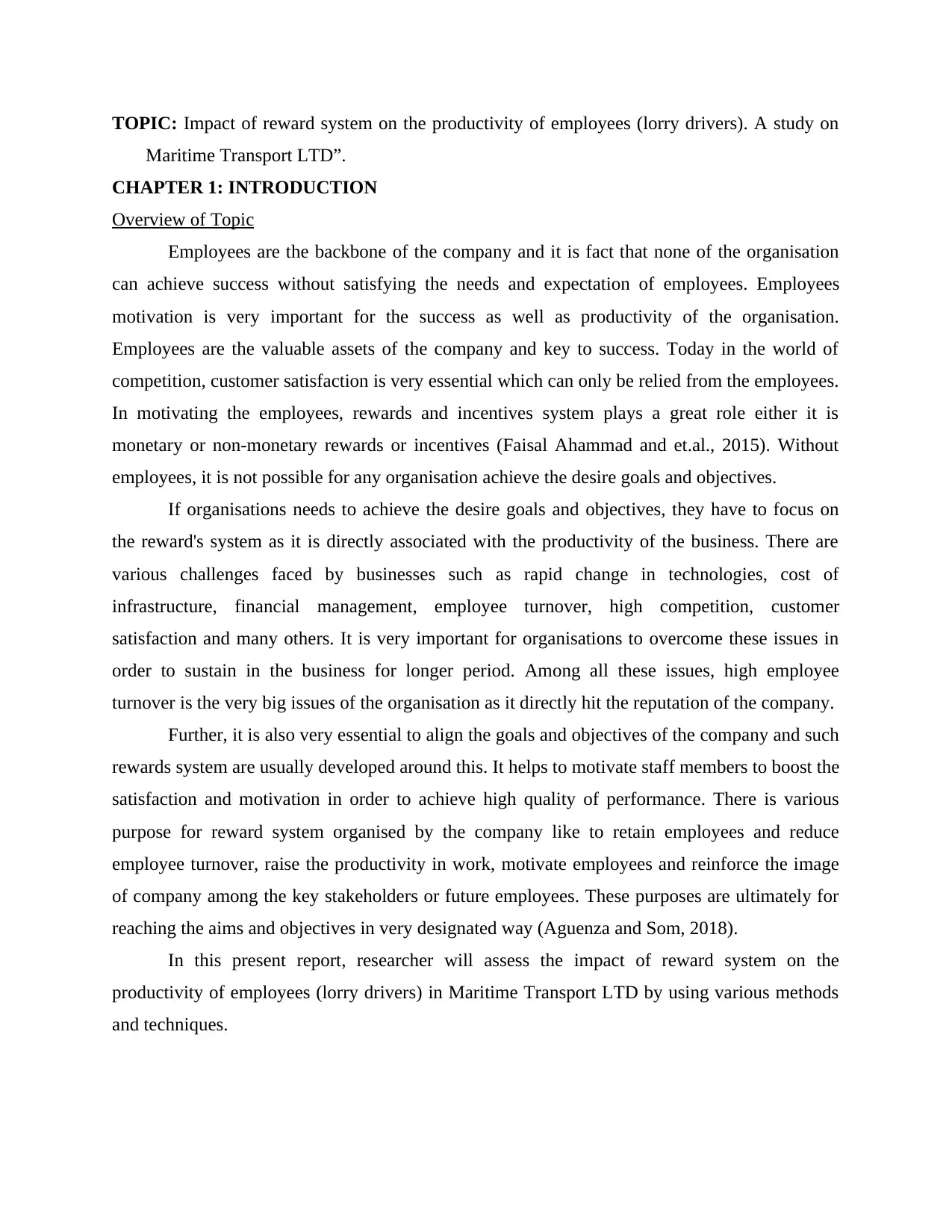
TOPIC: Impact of reward system on the productivity of employees (lorry drivers). A study on
Maritime Transport LTD”.
CHAPTER 1: INTRODUCTION
Overview of Topic
Employees are the backbone of the company and it is fact that none of the organisation
can achieve success without satisfying the needs and expectation of employees. Employees
motivation is very important for the success as well as productivity of the organisation.
Employees are the valuable assets of the company and key to success. Today in the world of
competition, customer satisfaction is very essential which can only be relied from the employees.
In motivating the employees, rewards and incentives system plays a great role either it is
monetary or non-monetary rewards or incentives (Faisal Ahammad and et.al., 2015). Without
employees, it is not possible for any organisation achieve the desire goals and objectives.
If organisations needs to achieve the desire goals and objectives, they have to focus on
the reward's system as it is directly associated with the productivity of the business. There are
various challenges faced by businesses such as rapid change in technologies, cost of
infrastructure, financial management, employee turnover, high competition, customer
satisfaction and many others. It is very important for organisations to overcome these issues in
order to sustain in the business for longer period. Among all these issues, high employee
turnover is the very big issues of the organisation as it directly hit the reputation of the company.
Further, it is also very essential to align the goals and objectives of the company and such
rewards system are usually developed around this. It helps to motivate staff members to boost the
satisfaction and motivation in order to achieve high quality of performance. There is various
purpose for reward system organised by the company like to retain employees and reduce
employee turnover, raise the productivity in work, motivate employees and reinforce the image
of company among the key stakeholders or future employees. These purposes are ultimately for
reaching the aims and objectives in very designated way (Aguenza and Som, 2018).
In this present report, researcher will assess the impact of reward system on the
productivity of employees (lorry drivers) in Maritime Transport LTD by using various methods
and techniques.
Maritime Transport LTD”.
CHAPTER 1: INTRODUCTION
Overview of Topic
Employees are the backbone of the company and it is fact that none of the organisation
can achieve success without satisfying the needs and expectation of employees. Employees
motivation is very important for the success as well as productivity of the organisation.
Employees are the valuable assets of the company and key to success. Today in the world of
competition, customer satisfaction is very essential which can only be relied from the employees.
In motivating the employees, rewards and incentives system plays a great role either it is
monetary or non-monetary rewards or incentives (Faisal Ahammad and et.al., 2015). Without
employees, it is not possible for any organisation achieve the desire goals and objectives.
If organisations needs to achieve the desire goals and objectives, they have to focus on
the reward's system as it is directly associated with the productivity of the business. There are
various challenges faced by businesses such as rapid change in technologies, cost of
infrastructure, financial management, employee turnover, high competition, customer
satisfaction and many others. It is very important for organisations to overcome these issues in
order to sustain in the business for longer period. Among all these issues, high employee
turnover is the very big issues of the organisation as it directly hit the reputation of the company.
Further, it is also very essential to align the goals and objectives of the company and such
rewards system are usually developed around this. It helps to motivate staff members to boost the
satisfaction and motivation in order to achieve high quality of performance. There is various
purpose for reward system organised by the company like to retain employees and reduce
employee turnover, raise the productivity in work, motivate employees and reinforce the image
of company among the key stakeholders or future employees. These purposes are ultimately for
reaching the aims and objectives in very designated way (Aguenza and Som, 2018).
In this present report, researcher will assess the impact of reward system on the
productivity of employees (lorry drivers) in Maritime Transport LTD by using various methods
and techniques.
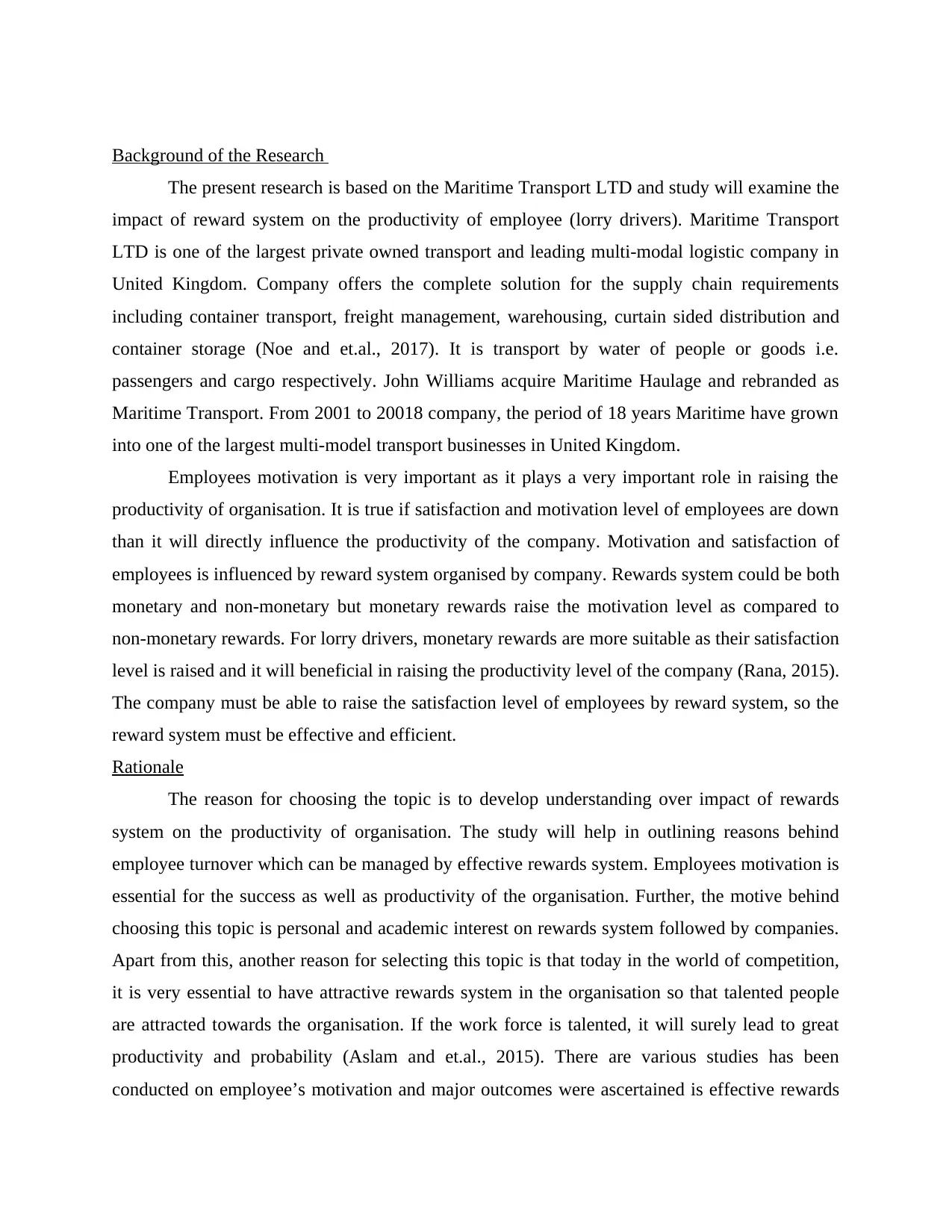
Background of the Research
The present research is based on the Maritime Transport LTD and study will examine the
impact of reward system on the productivity of employee (lorry drivers). Maritime Transport
LTD is one of the largest private owned transport and leading multi-modal logistic company in
United Kingdom. Company offers the complete solution for the supply chain requirements
including container transport, freight management, warehousing, curtain sided distribution and
container storage (Noe and et.al., 2017). It is transport by water of people or goods i.e.
passengers and cargo respectively. John Williams acquire Maritime Haulage and rebranded as
Maritime Transport. From 2001 to 20018 company, the period of 18 years Maritime have grown
into one of the largest multi-model transport businesses in United Kingdom.
Employees motivation is very important as it plays a very important role in raising the
productivity of organisation. It is true if satisfaction and motivation level of employees are down
than it will directly influence the productivity of the company. Motivation and satisfaction of
employees is influenced by reward system organised by company. Rewards system could be both
monetary and non-monetary but monetary rewards raise the motivation level as compared to
non-monetary rewards. For lorry drivers, monetary rewards are more suitable as their satisfaction
level is raised and it will beneficial in raising the productivity level of the company (Rana, 2015).
The company must be able to raise the satisfaction level of employees by reward system, so the
reward system must be effective and efficient.
Rationale
The reason for choosing the topic is to develop understanding over impact of rewards
system on the productivity of organisation. The study will help in outlining reasons behind
employee turnover which can be managed by effective rewards system. Employees motivation is
essential for the success as well as productivity of the organisation. Further, the motive behind
choosing this topic is personal and academic interest on rewards system followed by companies.
Apart from this, another reason for selecting this topic is that today in the world of competition,
it is very essential to have attractive rewards system in the organisation so that talented people
are attracted towards the organisation. If the work force is talented, it will surely lead to great
productivity and probability (Aslam and et.al., 2015). There are various studies has been
conducted on employee’s motivation and major outcomes were ascertained is effective rewards
The present research is based on the Maritime Transport LTD and study will examine the
impact of reward system on the productivity of employee (lorry drivers). Maritime Transport
LTD is one of the largest private owned transport and leading multi-modal logistic company in
United Kingdom. Company offers the complete solution for the supply chain requirements
including container transport, freight management, warehousing, curtain sided distribution and
container storage (Noe and et.al., 2017). It is transport by water of people or goods i.e.
passengers and cargo respectively. John Williams acquire Maritime Haulage and rebranded as
Maritime Transport. From 2001 to 20018 company, the period of 18 years Maritime have grown
into one of the largest multi-model transport businesses in United Kingdom.
Employees motivation is very important as it plays a very important role in raising the
productivity of organisation. It is true if satisfaction and motivation level of employees are down
than it will directly influence the productivity of the company. Motivation and satisfaction of
employees is influenced by reward system organised by company. Rewards system could be both
monetary and non-monetary but monetary rewards raise the motivation level as compared to
non-monetary rewards. For lorry drivers, monetary rewards are more suitable as their satisfaction
level is raised and it will beneficial in raising the productivity level of the company (Rana, 2015).
The company must be able to raise the satisfaction level of employees by reward system, so the
reward system must be effective and efficient.
Rationale
The reason for choosing the topic is to develop understanding over impact of rewards
system on the productivity of organisation. The study will help in outlining reasons behind
employee turnover which can be managed by effective rewards system. Employees motivation is
essential for the success as well as productivity of the organisation. Further, the motive behind
choosing this topic is personal and academic interest on rewards system followed by companies.
Apart from this, another reason for selecting this topic is that today in the world of competition,
it is very essential to have attractive rewards system in the organisation so that talented people
are attracted towards the organisation. If the work force is talented, it will surely lead to great
productivity and probability (Aslam and et.al., 2015). There are various studies has been
conducted on employee’s motivation and major outcomes were ascertained is effective rewards
⊘ This is a preview!⊘
Do you want full access?
Subscribe today to unlock all pages.

Trusted by 1+ million students worldwide
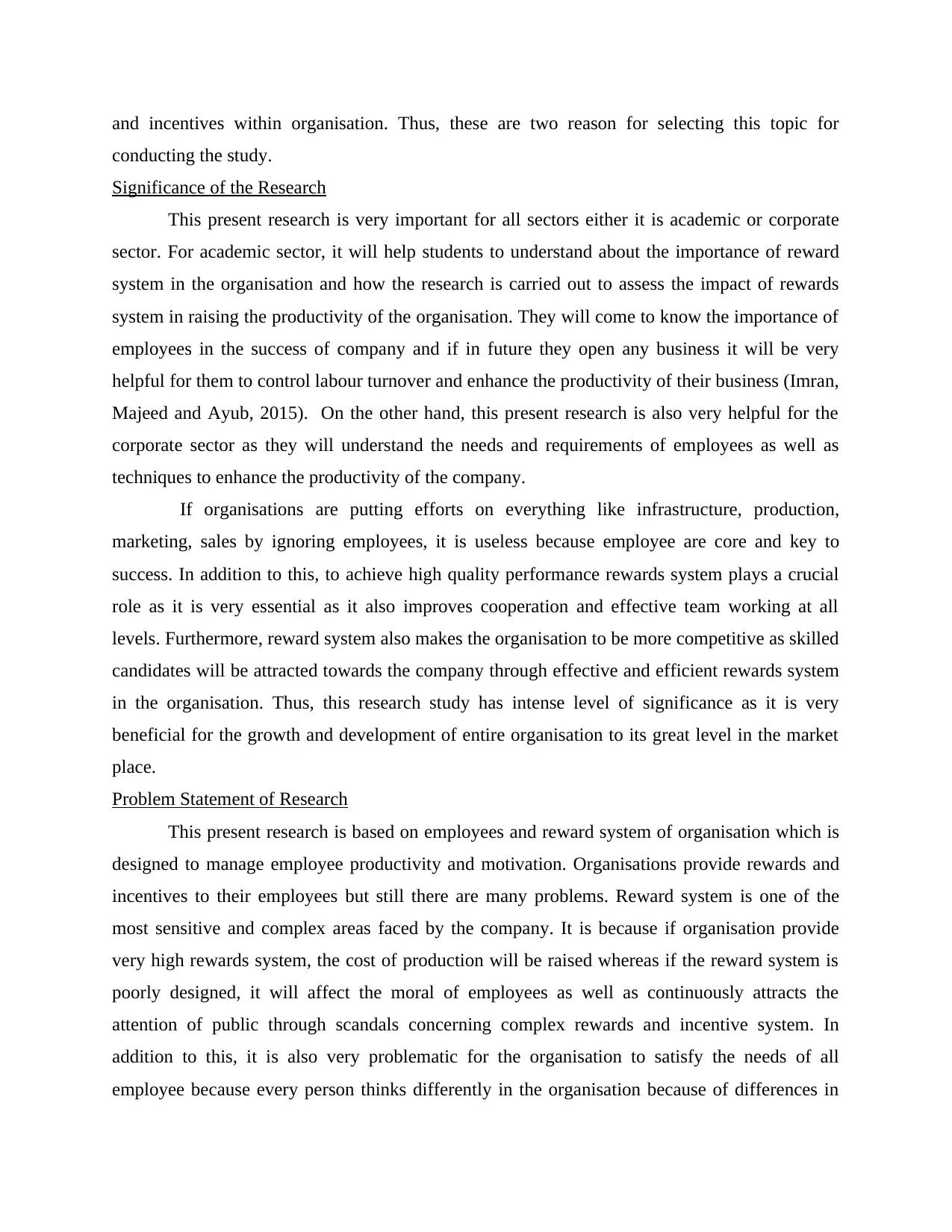
and incentives within organisation. Thus, these are two reason for selecting this topic for
conducting the study.
Significance of the Research
This present research is very important for all sectors either it is academic or corporate
sector. For academic sector, it will help students to understand about the importance of reward
system in the organisation and how the research is carried out to assess the impact of rewards
system in raising the productivity of the organisation. They will come to know the importance of
employees in the success of company and if in future they open any business it will be very
helpful for them to control labour turnover and enhance the productivity of their business (Imran,
Majeed and Ayub, 2015). On the other hand, this present research is also very helpful for the
corporate sector as they will understand the needs and requirements of employees as well as
techniques to enhance the productivity of the company.
If organisations are putting efforts on everything like infrastructure, production,
marketing, sales by ignoring employees, it is useless because employee are core and key to
success. In addition to this, to achieve high quality performance rewards system plays a crucial
role as it is very essential as it also improves cooperation and effective team working at all
levels. Furthermore, reward system also makes the organisation to be more competitive as skilled
candidates will be attracted towards the company through effective and efficient rewards system
in the organisation. Thus, this research study has intense level of significance as it is very
beneficial for the growth and development of entire organisation to its great level in the market
place.
Problem Statement of Research
This present research is based on employees and reward system of organisation which is
designed to manage employee productivity and motivation. Organisations provide rewards and
incentives to their employees but still there are many problems. Reward system is one of the
most sensitive and complex areas faced by the company. It is because if organisation provide
very high rewards system, the cost of production will be raised whereas if the reward system is
poorly designed, it will affect the moral of employees as well as continuously attracts the
attention of public through scandals concerning complex rewards and incentive system. In
addition to this, it is also very problematic for the organisation to satisfy the needs of all
employee because every person thinks differently in the organisation because of differences in
conducting the study.
Significance of the Research
This present research is very important for all sectors either it is academic or corporate
sector. For academic sector, it will help students to understand about the importance of reward
system in the organisation and how the research is carried out to assess the impact of rewards
system in raising the productivity of the organisation. They will come to know the importance of
employees in the success of company and if in future they open any business it will be very
helpful for them to control labour turnover and enhance the productivity of their business (Imran,
Majeed and Ayub, 2015). On the other hand, this present research is also very helpful for the
corporate sector as they will understand the needs and requirements of employees as well as
techniques to enhance the productivity of the company.
If organisations are putting efforts on everything like infrastructure, production,
marketing, sales by ignoring employees, it is useless because employee are core and key to
success. In addition to this, to achieve high quality performance rewards system plays a crucial
role as it is very essential as it also improves cooperation and effective team working at all
levels. Furthermore, reward system also makes the organisation to be more competitive as skilled
candidates will be attracted towards the company through effective and efficient rewards system
in the organisation. Thus, this research study has intense level of significance as it is very
beneficial for the growth and development of entire organisation to its great level in the market
place.
Problem Statement of Research
This present research is based on employees and reward system of organisation which is
designed to manage employee productivity and motivation. Organisations provide rewards and
incentives to their employees but still there are many problems. Reward system is one of the
most sensitive and complex areas faced by the company. It is because if organisation provide
very high rewards system, the cost of production will be raised whereas if the reward system is
poorly designed, it will affect the moral of employees as well as continuously attracts the
attention of public through scandals concerning complex rewards and incentive system. In
addition to this, it is also very problematic for the organisation to satisfy the needs of all
employee because every person thinks differently in the organisation because of differences in
Paraphrase This Document
Need a fresh take? Get an instant paraphrase of this document with our AI Paraphraser
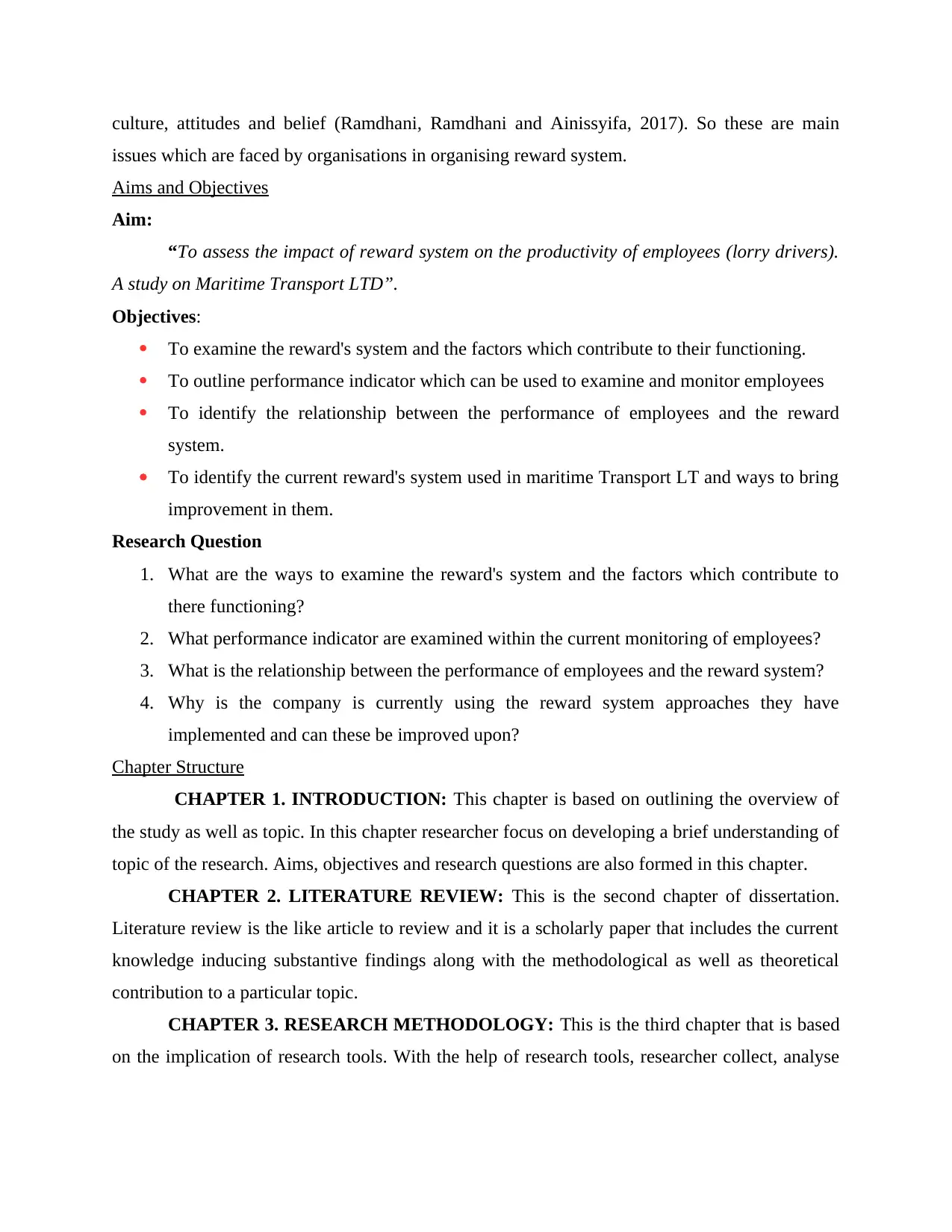
culture, attitudes and belief (Ramdhani, Ramdhani and Ainissyifa, 2017). So these are main
issues which are faced by organisations in organising reward system.
Aims and Objectives
Aim:
“To assess the impact of reward system on the productivity of employees (lorry drivers).
A study on Maritime Transport LTD”.
Objectives:
To examine the reward's system and the factors which contribute to their functioning.
To outline performance indicator which can be used to examine and monitor employees
To identify the relationship between the performance of employees and the reward
system.
To identify the current reward's system used in maritime Transport LT and ways to bring
improvement in them.
Research Question
1. What are the ways to examine the reward's system and the factors which contribute to
there functioning?
2. What performance indicator are examined within the current monitoring of employees?
3. What is the relationship between the performance of employees and the reward system?
4. Why is the company is currently using the reward system approaches they have
implemented and can these be improved upon?
Chapter Structure
CHAPTER 1. INTRODUCTION: This chapter is based on outlining the overview of
the study as well as topic. In this chapter researcher focus on developing a brief understanding of
topic of the research. Aims, objectives and research questions are also formed in this chapter.
CHAPTER 2. LITERATURE REVIEW: This is the second chapter of dissertation.
Literature review is the like article to review and it is a scholarly paper that includes the current
knowledge inducing substantive findings along with the methodological as well as theoretical
contribution to a particular topic.
CHAPTER 3. RESEARCH METHODOLOGY: This is the third chapter that is based
on the implication of research tools. With the help of research tools, researcher collect, analyse
issues which are faced by organisations in organising reward system.
Aims and Objectives
Aim:
“To assess the impact of reward system on the productivity of employees (lorry drivers).
A study on Maritime Transport LTD”.
Objectives:
To examine the reward's system and the factors which contribute to their functioning.
To outline performance indicator which can be used to examine and monitor employees
To identify the relationship between the performance of employees and the reward
system.
To identify the current reward's system used in maritime Transport LT and ways to bring
improvement in them.
Research Question
1. What are the ways to examine the reward's system and the factors which contribute to
there functioning?
2. What performance indicator are examined within the current monitoring of employees?
3. What is the relationship between the performance of employees and the reward system?
4. Why is the company is currently using the reward system approaches they have
implemented and can these be improved upon?
Chapter Structure
CHAPTER 1. INTRODUCTION: This chapter is based on outlining the overview of
the study as well as topic. In this chapter researcher focus on developing a brief understanding of
topic of the research. Aims, objectives and research questions are also formed in this chapter.
CHAPTER 2. LITERATURE REVIEW: This is the second chapter of dissertation.
Literature review is the like article to review and it is a scholarly paper that includes the current
knowledge inducing substantive findings along with the methodological as well as theoretical
contribution to a particular topic.
CHAPTER 3. RESEARCH METHODOLOGY: This is the third chapter that is based
on the implication of research tools. With the help of research tools, researcher collect, analyse
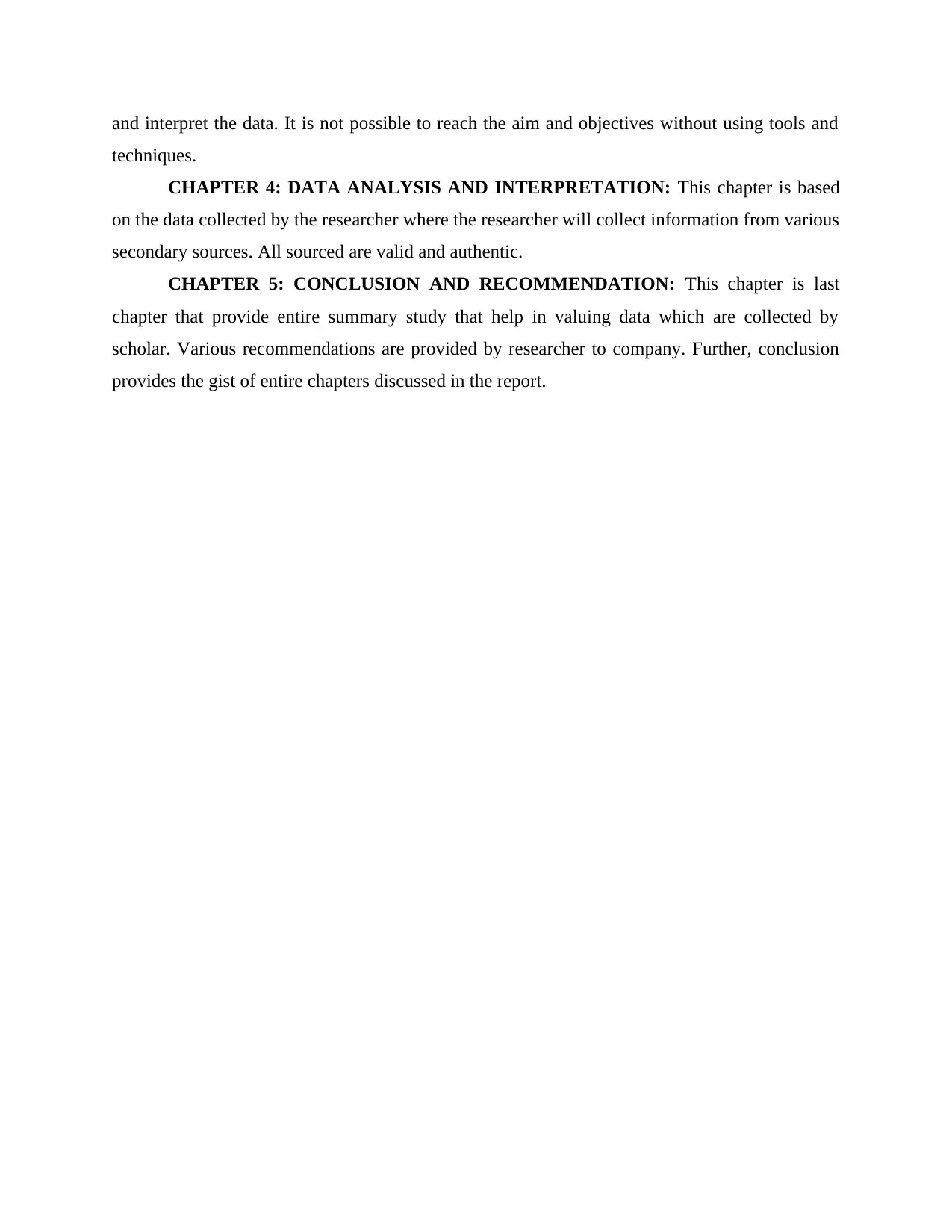
and interpret the data. It is not possible to reach the aim and objectives without using tools and
techniques.
CHAPTER 4: DATA ANALYSIS AND INTERPRETATION: This chapter is based
on the data collected by the researcher where the researcher will collect information from various
secondary sources. All sourced are valid and authentic.
CHAPTER 5: CONCLUSION AND RECOMMENDATION: This chapter is last
chapter that provide entire summary study that help in valuing data which are collected by
scholar. Various recommendations are provided by researcher to company. Further, conclusion
provides the gist of entire chapters discussed in the report.
techniques.
CHAPTER 4: DATA ANALYSIS AND INTERPRETATION: This chapter is based
on the data collected by the researcher where the researcher will collect information from various
secondary sources. All sourced are valid and authentic.
CHAPTER 5: CONCLUSION AND RECOMMENDATION: This chapter is last
chapter that provide entire summary study that help in valuing data which are collected by
scholar. Various recommendations are provided by researcher to company. Further, conclusion
provides the gist of entire chapters discussed in the report.
⊘ This is a preview!⊘
Do you want full access?
Subscribe today to unlock all pages.

Trusted by 1+ million students worldwide
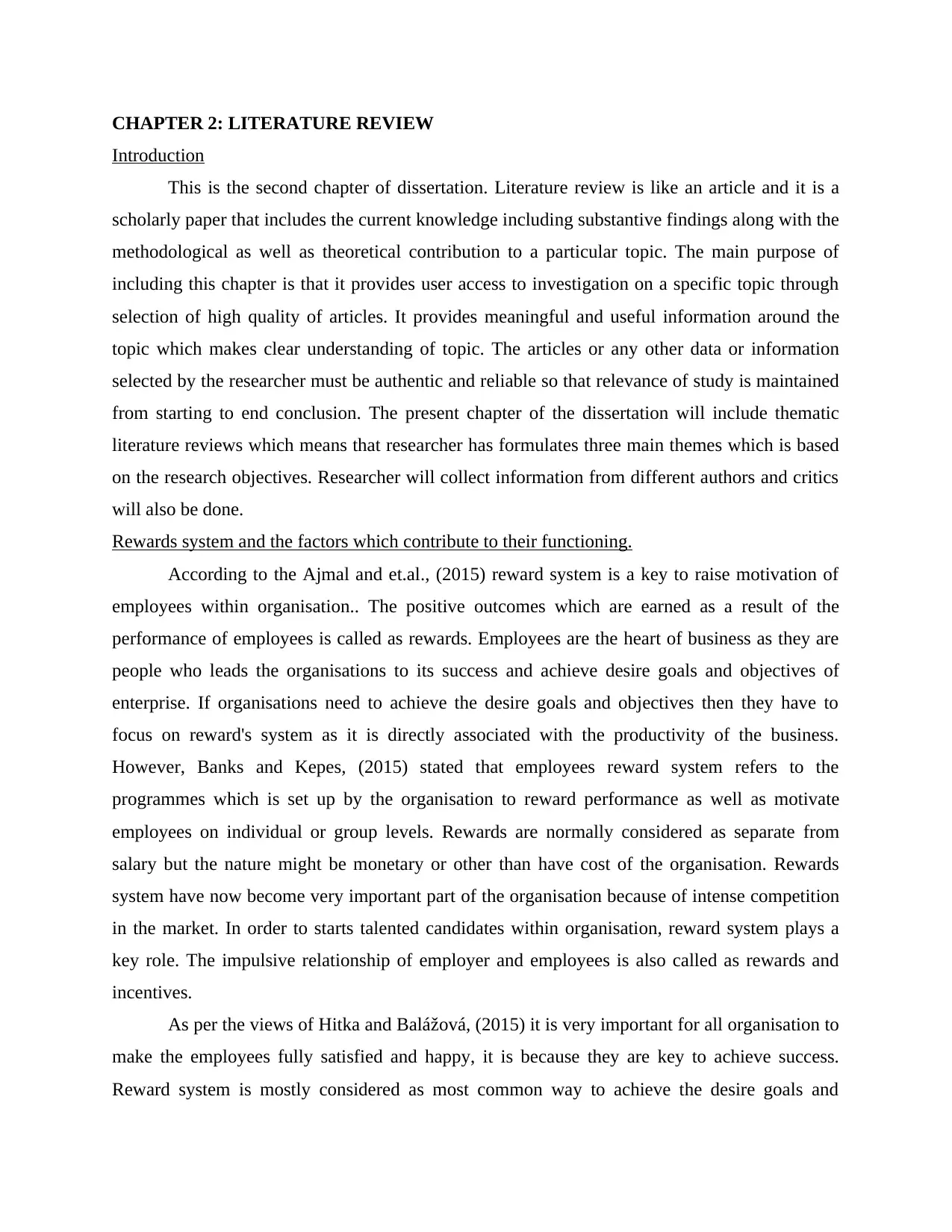
CHAPTER 2: LITERATURE REVIEW
Introduction
This is the second chapter of dissertation. Literature review is like an article and it is a
scholarly paper that includes the current knowledge including substantive findings along with the
methodological as well as theoretical contribution to a particular topic. The main purpose of
including this chapter is that it provides user access to investigation on a specific topic through
selection of high quality of articles. It provides meaningful and useful information around the
topic which makes clear understanding of topic. The articles or any other data or information
selected by the researcher must be authentic and reliable so that relevance of study is maintained
from starting to end conclusion. The present chapter of the dissertation will include thematic
literature reviews which means that researcher has formulates three main themes which is based
on the research objectives. Researcher will collect information from different authors and critics
will also be done.
Rewards system and the factors which contribute to their functioning.
According to the Ajmal and et.al., (2015) reward system is a key to raise motivation of
employees within organisation.. The positive outcomes which are earned as a result of the
performance of employees is called as rewards. Employees are the heart of business as they are
people who leads the organisations to its success and achieve desire goals and objectives of
enterprise. If organisations need to achieve the desire goals and objectives then they have to
focus on reward's system as it is directly associated with the productivity of the business.
However, Banks and Kepes, (2015) stated that employees reward system refers to the
programmes which is set up by the organisation to reward performance as well as motivate
employees on individual or group levels. Rewards are normally considered as separate from
salary but the nature might be monetary or other than have cost of the organisation. Rewards
system have now become very important part of the organisation because of intense competition
in the market. In order to starts talented candidates within organisation, reward system plays a
key role. The impulsive relationship of employer and employees is also called as rewards and
incentives.
As per the views of Hitka and Balážová, (2015) it is very important for all organisation to
make the employees fully satisfied and happy, it is because they are key to achieve success.
Reward system is mostly considered as most common way to achieve the desire goals and
Introduction
This is the second chapter of dissertation. Literature review is like an article and it is a
scholarly paper that includes the current knowledge including substantive findings along with the
methodological as well as theoretical contribution to a particular topic. The main purpose of
including this chapter is that it provides user access to investigation on a specific topic through
selection of high quality of articles. It provides meaningful and useful information around the
topic which makes clear understanding of topic. The articles or any other data or information
selected by the researcher must be authentic and reliable so that relevance of study is maintained
from starting to end conclusion. The present chapter of the dissertation will include thematic
literature reviews which means that researcher has formulates three main themes which is based
on the research objectives. Researcher will collect information from different authors and critics
will also be done.
Rewards system and the factors which contribute to their functioning.
According to the Ajmal and et.al., (2015) reward system is a key to raise motivation of
employees within organisation.. The positive outcomes which are earned as a result of the
performance of employees is called as rewards. Employees are the heart of business as they are
people who leads the organisations to its success and achieve desire goals and objectives of
enterprise. If organisations need to achieve the desire goals and objectives then they have to
focus on reward's system as it is directly associated with the productivity of the business.
However, Banks and Kepes, (2015) stated that employees reward system refers to the
programmes which is set up by the organisation to reward performance as well as motivate
employees on individual or group levels. Rewards are normally considered as separate from
salary but the nature might be monetary or other than have cost of the organisation. Rewards
system have now become very important part of the organisation because of intense competition
in the market. In order to starts talented candidates within organisation, reward system plays a
key role. The impulsive relationship of employer and employees is also called as rewards and
incentives.
As per the views of Hitka and Balážová, (2015) it is very important for all organisation to
make the employees fully satisfied and happy, it is because they are key to achieve success.
Reward system is mostly considered as most common way to achieve the desire goals and
Paraphrase This Document
Need a fresh take? Get an instant paraphrase of this document with our AI Paraphraser
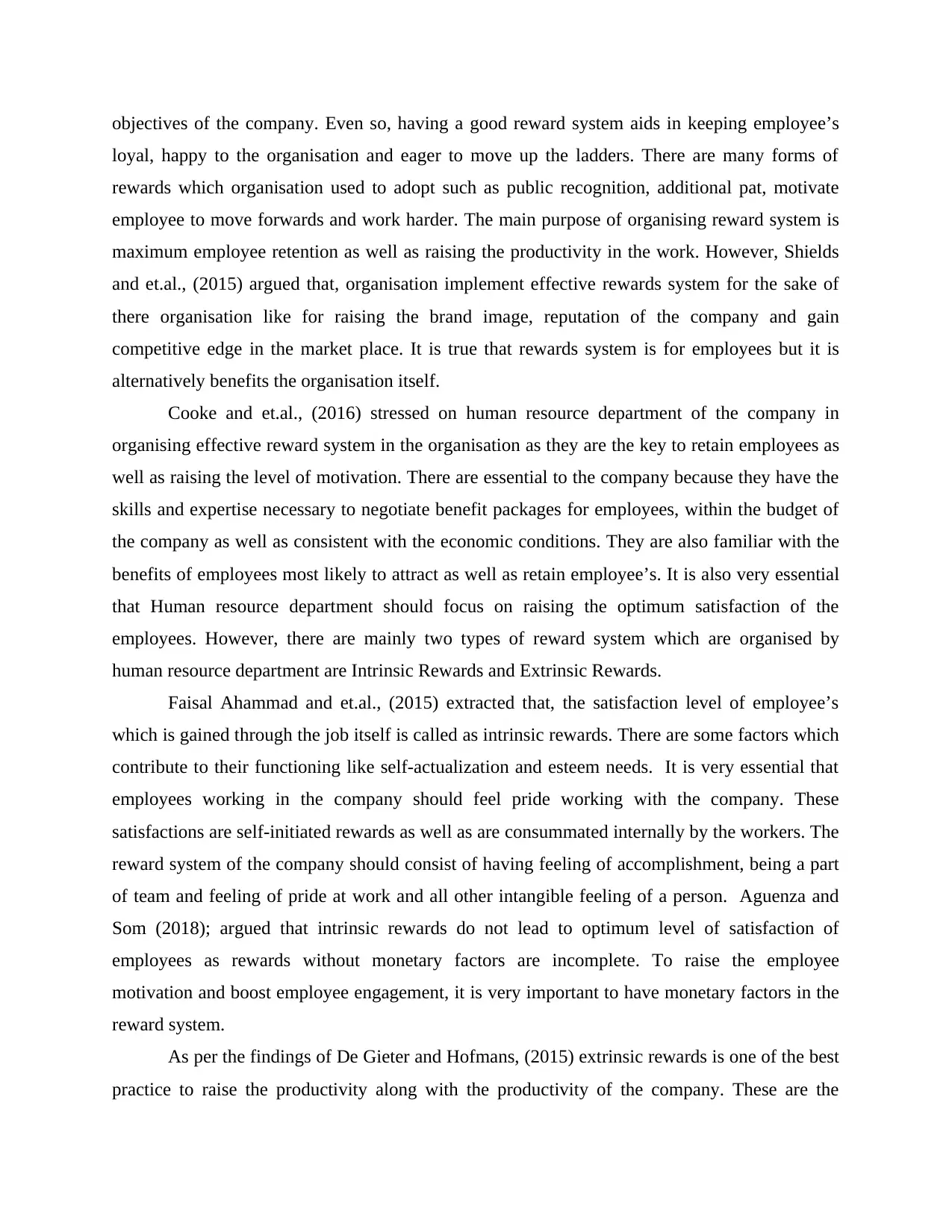
objectives of the company. Even so, having a good reward system aids in keeping employee’s
loyal, happy to the organisation and eager to move up the ladders. There are many forms of
rewards which organisation used to adopt such as public recognition, additional pat, motivate
employee to move forwards and work harder. The main purpose of organising reward system is
maximum employee retention as well as raising the productivity in the work. However, Shields
and et.al., (2015) argued that, organisation implement effective rewards system for the sake of
there organisation like for raising the brand image, reputation of the company and gain
competitive edge in the market place. It is true that rewards system is for employees but it is
alternatively benefits the organisation itself.
Cooke and et.al., (2016) stressed on human resource department of the company in
organising effective reward system in the organisation as they are the key to retain employees as
well as raising the level of motivation. There are essential to the company because they have the
skills and expertise necessary to negotiate benefit packages for employees, within the budget of
the company as well as consistent with the economic conditions. They are also familiar with the
benefits of employees most likely to attract as well as retain employee’s. It is also very essential
that Human resource department should focus on raising the optimum satisfaction of the
employees. However, there are mainly two types of reward system which are organised by
human resource department are Intrinsic Rewards and Extrinsic Rewards.
Faisal Ahammad and et.al., (2015) extracted that, the satisfaction level of employee’s
which is gained through the job itself is called as intrinsic rewards. There are some factors which
contribute to their functioning like self-actualization and esteem needs. It is very essential that
employees working in the company should feel pride working with the company. These
satisfactions are self-initiated rewards as well as are consummated internally by the workers. The
reward system of the company should consist of having feeling of accomplishment, being a part
of team and feeling of pride at work and all other intangible feeling of a person. Aguenza and
Som (2018); argued that intrinsic rewards do not lead to optimum level of satisfaction of
employees as rewards without monetary factors are incomplete. To raise the employee
motivation and boost employee engagement, it is very important to have monetary factors in the
reward system.
As per the findings of De Gieter and Hofmans, (2015) extrinsic rewards is one of the best
practice to raise the productivity along with the productivity of the company. These are the
loyal, happy to the organisation and eager to move up the ladders. There are many forms of
rewards which organisation used to adopt such as public recognition, additional pat, motivate
employee to move forwards and work harder. The main purpose of organising reward system is
maximum employee retention as well as raising the productivity in the work. However, Shields
and et.al., (2015) argued that, organisation implement effective rewards system for the sake of
there organisation like for raising the brand image, reputation of the company and gain
competitive edge in the market place. It is true that rewards system is for employees but it is
alternatively benefits the organisation itself.
Cooke and et.al., (2016) stressed on human resource department of the company in
organising effective reward system in the organisation as they are the key to retain employees as
well as raising the level of motivation. There are essential to the company because they have the
skills and expertise necessary to negotiate benefit packages for employees, within the budget of
the company as well as consistent with the economic conditions. They are also familiar with the
benefits of employees most likely to attract as well as retain employee’s. It is also very essential
that Human resource department should focus on raising the optimum satisfaction of the
employees. However, there are mainly two types of reward system which are organised by
human resource department are Intrinsic Rewards and Extrinsic Rewards.
Faisal Ahammad and et.al., (2015) extracted that, the satisfaction level of employee’s
which is gained through the job itself is called as intrinsic rewards. There are some factors which
contribute to their functioning like self-actualization and esteem needs. It is very essential that
employees working in the company should feel pride working with the company. These
satisfactions are self-initiated rewards as well as are consummated internally by the workers. The
reward system of the company should consist of having feeling of accomplishment, being a part
of team and feeling of pride at work and all other intangible feeling of a person. Aguenza and
Som (2018); argued that intrinsic rewards do not lead to optimum level of satisfaction of
employees as rewards without monetary factors are incomplete. To raise the employee
motivation and boost employee engagement, it is very important to have monetary factors in the
reward system.
As per the findings of De Gieter and Hofmans, (2015) extrinsic rewards is one of the best
practice to raise the productivity along with the productivity of the company. These are the
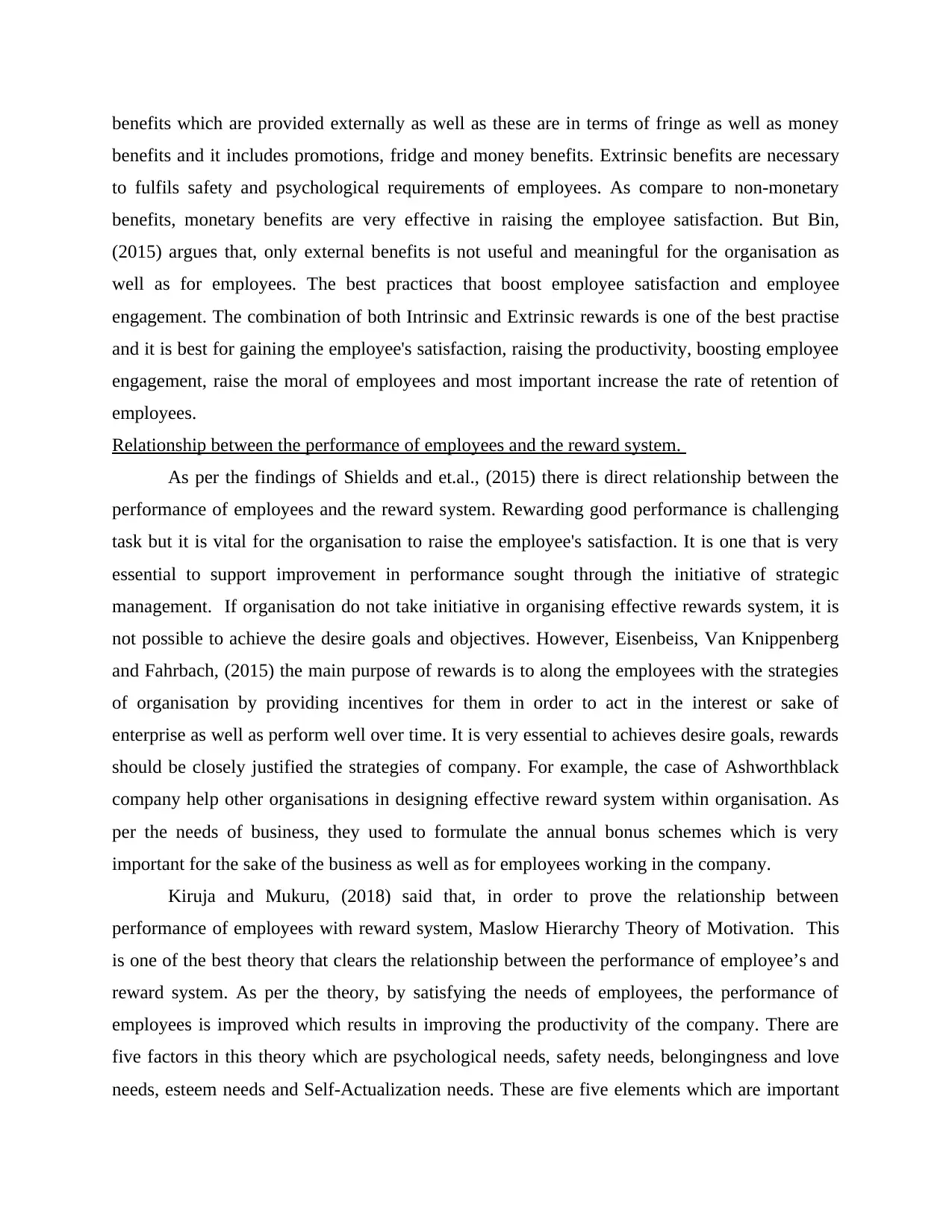
benefits which are provided externally as well as these are in terms of fringe as well as money
benefits and it includes promotions, fridge and money benefits. Extrinsic benefits are necessary
to fulfils safety and psychological requirements of employees. As compare to non-monetary
benefits, monetary benefits are very effective in raising the employee satisfaction. But Bin,
(2015) argues that, only external benefits is not useful and meaningful for the organisation as
well as for employees. The best practices that boost employee satisfaction and employee
engagement. The combination of both Intrinsic and Extrinsic rewards is one of the best practise
and it is best for gaining the employee's satisfaction, raising the productivity, boosting employee
engagement, raise the moral of employees and most important increase the rate of retention of
employees.
Relationship between the performance of employees and the reward system.
As per the findings of Shields and et.al., (2015) there is direct relationship between the
performance of employees and the reward system. Rewarding good performance is challenging
task but it is vital for the organisation to raise the employee's satisfaction. It is one that is very
essential to support improvement in performance sought through the initiative of strategic
management. If organisation do not take initiative in organising effective rewards system, it is
not possible to achieve the desire goals and objectives. However, Eisenbeiss, Van Knippenberg
and Fahrbach, (2015) the main purpose of rewards is to along the employees with the strategies
of organisation by providing incentives for them in order to act in the interest or sake of
enterprise as well as perform well over time. It is very essential to achieves desire goals, rewards
should be closely justified the strategies of company. For example, the case of Ashworthblack
company help other organisations in designing effective reward system within organisation. As
per the needs of business, they used to formulate the annual bonus schemes which is very
important for the sake of the business as well as for employees working in the company.
Kiruja and Mukuru, (2018) said that, in order to prove the relationship between
performance of employees with reward system, Maslow Hierarchy Theory of Motivation. This
is one of the best theory that clears the relationship between the performance of employee’s and
reward system. As per the theory, by satisfying the needs of employees, the performance of
employees is improved which results in improving the productivity of the company. There are
five factors in this theory which are psychological needs, safety needs, belongingness and love
needs, esteem needs and Self-Actualization needs. These are five elements which are important
benefits and it includes promotions, fridge and money benefits. Extrinsic benefits are necessary
to fulfils safety and psychological requirements of employees. As compare to non-monetary
benefits, monetary benefits are very effective in raising the employee satisfaction. But Bin,
(2015) argues that, only external benefits is not useful and meaningful for the organisation as
well as for employees. The best practices that boost employee satisfaction and employee
engagement. The combination of both Intrinsic and Extrinsic rewards is one of the best practise
and it is best for gaining the employee's satisfaction, raising the productivity, boosting employee
engagement, raise the moral of employees and most important increase the rate of retention of
employees.
Relationship between the performance of employees and the reward system.
As per the findings of Shields and et.al., (2015) there is direct relationship between the
performance of employees and the reward system. Rewarding good performance is challenging
task but it is vital for the organisation to raise the employee's satisfaction. It is one that is very
essential to support improvement in performance sought through the initiative of strategic
management. If organisation do not take initiative in organising effective rewards system, it is
not possible to achieve the desire goals and objectives. However, Eisenbeiss, Van Knippenberg
and Fahrbach, (2015) the main purpose of rewards is to along the employees with the strategies
of organisation by providing incentives for them in order to act in the interest or sake of
enterprise as well as perform well over time. It is very essential to achieves desire goals, rewards
should be closely justified the strategies of company. For example, the case of Ashworthblack
company help other organisations in designing effective reward system within organisation. As
per the needs of business, they used to formulate the annual bonus schemes which is very
important for the sake of the business as well as for employees working in the company.
Kiruja and Mukuru, (2018) said that, in order to prove the relationship between
performance of employees with reward system, Maslow Hierarchy Theory of Motivation. This
is one of the best theory that clears the relationship between the performance of employee’s and
reward system. As per the theory, by satisfying the needs of employees, the performance of
employees is improved which results in improving the productivity of the company. There are
five factors in this theory which are psychological needs, safety needs, belongingness and love
needs, esteem needs and Self-Actualization needs. These are five elements which are important
⊘ This is a preview!⊘
Do you want full access?
Subscribe today to unlock all pages.

Trusted by 1+ million students worldwide
1 out of 47
Related Documents
Your All-in-One AI-Powered Toolkit for Academic Success.
+13062052269
info@desklib.com
Available 24*7 on WhatsApp / Email
![[object Object]](/_next/static/media/star-bottom.7253800d.svg)
Unlock your academic potential
Copyright © 2020–2026 A2Z Services. All Rights Reserved. Developed and managed by ZUCOL.





